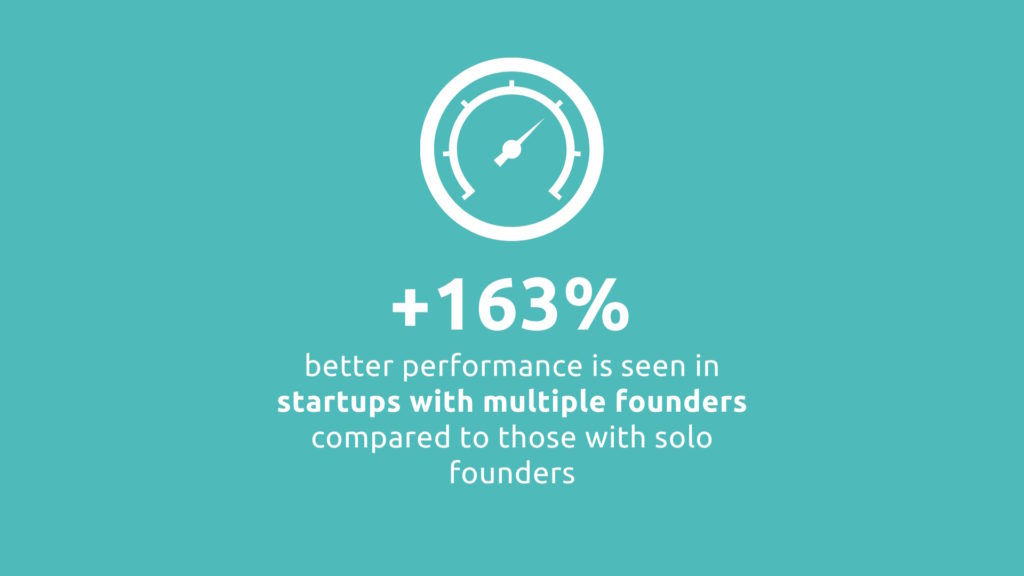How to Find Technical Co-Founder in 2025

In an era where technology is not just evolving but exploding – thanks to groundbreaking advancements in areas like AI, machine learning, and blockchain – the success of a startup hinges on more than just a great idea. It demands the right leadership duo. That's where a technical co-founder transforms your startup's trajectory from good to extraordinary.
For entrepreneurs who are visionaries but not necessarily tech wizards, the journey to find a technical co-founder is less about recruitment and more about forming a powerful alliance. This guide is your roadmap to identifying a co-founder who resonates with your dream and is equipped to bring it to life. We’ll explore how to spot this key collaborator, understand their integral role, and foster a partnership that becomes the beating heart of your startup’s success.
Join us as we chart the course for creating dynamic tech partnerships in 2025, ensuring your startup isn't just running the race but leading it.
The Role of a Technical Co-Founder
A technical co-founder is more than just a tech expert; they are the chief architect of your startup's technological pathway. Their role encompasses:
- Strategic Tech Visioning: Beyond understanding coding and system design, they bring a strategic perspective to the company's technological direction.
- Tech Development and Implementation: They spearhead the development of the tech aspect of your business, ensuring that every tech element aligns with your company’s goals.
- Leadership in Technology: Leading the tech team is a key responsibility, guiding them to meet and exceed the technical requirements of the business.
- Decision-Making: Their role involves making critical decisions regarding
- Technical infrastructure
- Software development processes
- Data security measures
- Staying Ahead of Trends: They keep abreast of emerging technologies, ensuring your startup remains at the forefront of innovation.
Their ultimate role is to bridge your startup’s technology needs with its business objectives, proving themselves as an indispensable part of your team in the rapidly evolving tech landscape.

Technical vs Non-Technical Co-Founders
In a startup, having both technical and non-technical co-founders forms a well-rounded leadership team. Here's how they each contribute:
- Non-Technical Co-Founder: Focuses on the business side, like marketing, sales, and setting the company's big-picture strategies.
- Technical Co-Founder: Handles the tech, ensuring the company's products or services are top-notch.
The non-technical co-founder understands the market and how to grow the business, while the technical one brings the necessary tech skills. Working together, they form a powerful duo that drives innovation and leads the startup to success.
Why Your Startup Needs a Technical Co-Founder
Lack of Tech Expertise
For a startup without a technical backbone, navigating the tech-centric ecosystem of 2025 can take a lot of time and effort. A technical co-founder fills this gap, providing the necessary tech expertise. They understand the latest technologies and how to effectively implement them in your business model.
Their expertise helps make informed decisions, from choosing the right tech stack to implementing efficient and scalable systems. This technical guidance is invaluable, especially when competing in markets driven by technological innovation.
MVP to Scale
Moving from an MVP (Minimum Viable Product) to a scalable product, a technical co-founder is a must. Here is why:
- Refining the MVP: They use their technical expertise to improve the product.
- Handling More Users: They make sure the product can support a growing number of users without issues.
- Adding New Features: They oversee the integration of new features to keep the product competitive.
- Ensuring Security: They ensure the product remains secure as it scales.
A technical co-founder is essential for startups aiming to expand quickly, making the product robust enough to meet increasing demands and reach new markets.
Long-Term Partner
A technical co-founder shares your entrepreneurial vision and is interested in the business's long-term success. This partnership builds on mutual trust and a shared commitment to the startup's goals, ensuring that both co-founders work towards the same objectives, overcome challenges, and celebrate successes together.
Investor Support
Having a technical co-founder can significantly boost investor confidence. Investors support a venture with a balanced team and clear technical leadership. A technical co-founder assures investors that the company's technology strategy is robust, forward-thinking, and capable of delivering on the business's promises.
This trust is crucial, especially in early funding rounds where the potential for technological scalability and innovation plays a pivotal role in investment decisions.
What To Look for in a Technical Co-Founder

Tech Expertise
When searching for a technical co-founder, prioritize someone with deep and relevant technical skills. Here's what to consider:
- Specific Skills: Ensure they have expertise in technologies critical to your startup, be it web development, mobile apps, AI, blockchain, or other key tech domains.
- Practical Experience: Look for someone who doesn't just know the theory but has applied these technologies successfully in the real world.
- Proven Track Record: A history of building scalable platforms, developing apps, or working with cutting-edge tech shows they can handle complex projects from start to finish.
- Adaptability and Learning: The ideal co-founder is always learning to keep up with new tech trends and advancements to stay ahead in the dynamic tech environment.
Choosing a co-founder with these qualities ensures your startup can navigate technical challenges and innovate continuously.
Passion For the Business
While technical know-how is essential, a co-founder's genuine dedication to growing the business after launch is just as important. Before teaming up, make sure they're fully committed:
- Check Their Focus: Confirm they're not juggling side projects that could detract from your startup.
- Assess Their Passion: They should be as invested in the business's success as you are.
A co-founder who matches your enthusiasm for both the product and business side helps keep things balanced and driven. This shared excitement is crucial for pushing the startup forward, keeping the momentum up, and hitting your collective targets. A strong, mutual drive often spells the difference between success and failure in a joint business venture.
Good Communication Skills
Being able to explain tech concepts simply is crucial. This skill makes sure everyone on the team, no matter their tech know-how, can join the conversation. It's all about removing obstacles and building a team culture where everyone shares and learns together.
But it's more than just cutting down on the tech speak. It's about making sure there's a real exchange of ideas. You and your technical co-founder need to have open, straightforward talks. This way, you can brainstorm and craft your business plan together effectively. Clear and open communication is the cornerstone of aligning your goals and making joint decisions smoothly.
Strengths That Complement Yours
A co-founder should bring strengths that complement your own. If you are strong in business development, a co-founder with a strong technical and product development background might be ideal. This complementary skill set can create a well-rounded leadership team capable of handling diverse aspects of the startup.
Risk Awareness
Startups are inherently risky, and a good technical co-founder should be able to identify and mitigate technological risks. Whether it's choosing the right technology stack or ensuring data security, their risk awareness can save the startup from potential pitfalls.
Self-sufficiency
In the early stages of a startup, resources are often limited. A technical co-founder who is self-sufficient and can wear multiple hats is invaluable. They should be capable of handling a range of tasks, from hands-on coding to strategic planning.
How to Find a Technical Co-Founder in 2025

Professional Engineering Networks
Leverage professional networks dedicated to engineering and technology. Platforms like LinkedIn, AngelList, and specific tech forums are rich with potential candidates. Attend industry webinars and engage in tech forums to connect with experienced professionals who might be interested in joining a startup.
Startup Incubators & Accelerators
Incubators and accelerators, such as Y Combinator and TechStars, are not only funding sources but also networking hubs. Many experienced technical professionals mentor or engage with these platforms, making them ideal for finding a technical co-founder. Participation in such programs also validates your startup, making it more attractive to potential co-founders.
Hackathons, Meetups, and Conferences
Hackathons, tech meetups, and conferences are excellent for meeting tech talent. These events are often attended by individuals passionate about technology and innovation who might be open to confounding opportunities.
Matchmaking Sites
Websites specifically designed for finding business partners and co-founders can be extremely useful. CoFoundersLab, Stealth, and FoundersNation - all these platforms allow you to search for individuals based on specific skills, experience, and interests relevant to your startup.
College Networks
Contact local universities and colleges, particularly those with strong engineering or computer science programs. Recent graduates or faculty members might be interested in joining a startup or could refer you to potential candidates.
What Are Technical Co-Founders Looking For
Personal Growth
Personal and professional development opportunities will attract a technical co-founder. They'll look for ways to enhance their skills, advance their career, and tackle the unique challenges your startup presents.
Salary
Early-stage startups often can't offer high salaries, but a technical co-founder will anticipate financial compensation once the startup secures funding or starts making money.
Equity
A technical co-founder typically expects a substantial share of equity in the startup. This share should match their contributions, expertise, and the startup's phase, acknowledging their pivotal role.
Presenting Your Vision to a Technical Co-Founder
When sharing your startup vision, emphasize the impact your company can make, the market opportunities available, and the critical role they will play in realizing this vision. Be open about the challenges ahead while staying realistic about what's achievable. Showing a detailed business plan, thorough market research, and feedback from potential customers can greatly enhance your credibility.
Fair Equity Distribution
Deciding on fair equity involves looking at the technical co-founder's role, your startup's development stage, and their contribution in expertise and effort. This distribution is typically negotiated to reach a mutual agreement. It's wise to seek legal counsel to ensure the equity deal is fair and legally solid.
Alternatives to Bringing On a Tech Co-Founder

Work with a Software Product Development Agency
If you're not ready to bring on a technical co-founder just yet, think about teaming up with Wiserbrand for your software development projects. Wiserbrand provides everything entrepreneurs need to turn their ideas into reality, without having to find a technical co-founder right away.
Our team specializes in converting your vision into a practical product. With our expertise in software development, we can build both a Minimum Viable Product (MVP) and a fully developed solution, tailored to your specific requirements. Beyond development, we offer strategic guidance and support to ensure your product not only meets but exceeds market expectations, enhancing your product's success.
Bring your idea to life! Contact us
We take great pride in our collaborative approach, partnering with you at every phase. Our objective is to ensure that your product is solid, ready for the market, and built on a strong foundation for growth, whether you're looking to scale up or bring on a technical co-founder.
Outsourcing to Freelancers
Another approach to consider before committing to a technical co-founder is to collaborate with a freelancer for your MVP development. The rise of platforms such as Upwork and Fiverr has simplified the process of connecting with freelancers with the specific skills your project requires, often accommodating various budget constraints.
However, it's important to remember that hiring a freelancer usually represents a short-term solution. While effective for initial development stages like building an MVP, this arrangement lacks the permanence and ongoing commitment you would get from a co-founder. Eventually, as your startup grows and evolves, you'll need to explore more sustainable options for continuing product development and maintenance.
No-Code Tools
No-code tools present a viable alternative to immediately seeking a technical co-founder, particularly in the initial stages of your startup. These tools enable you to create functional applications and programs without any coding knowledge, primarily through user-friendly drag-and-drop interfaces.
While no-code platforms may have limitations in terms of customization and scalability, they offer a valuable opportunity to materialize a basic version of your app concept. This initial prototype serves as a tangible proof of concept, which can be instrumental in understanding the viability of your idea.
Learning to Code Yourself
If you're currently not equipped with programming skills, learning how to code yourself is an alternative option. While traditional college and university programs offer comprehensive coding education, they might not be feasible for everyone, especially if you're already engaged in or have completed studies in a different field like business or marketing.
Fortunately, the digital age presents numerous accessible avenues for learning coding outside the confines of multi-year degree programs. Online learning platforms such as Codecademy and Udemy offer a range of courses tailored for beginners, providing a flexible and cost-effective way to start your coding journey.
Moreover, coding boot camps could be an excellent choice if you're looking for a more immersive and intensive learning experience. These programs, available both online and in-person across various locations, typically span 12-24 weeks. They are designed to provide accelerated learning, helping you grasp the fundamentals of coding and potentially more advanced concepts in a relatively short time frame.
Final Words
In summary, finding the right technical co-founder requires a strategic approach, considering the evolving tech landscape and the specific needs of your startup. Your entrepreneurial path can be successful and rewarding with the right partner. Remember, it's about matching skills and finding someone who aligns with your vision and dedication.
FAQ
A technical co-founder defines and executes the startup's technology strategy, builds and scales the product, leads the engineering efforts, and makes critical decisions about infrastructure and security.
Search professional engineering networks, startup incubators and accelerators, hackathons and tech conferences, college and alumni channels, and dedicated co-founder matchmaking platforms.
Look for relevant technical expertise and a proven track record, strong communication skills, passion for the business, complementary strengths to yours, and the ability to be self-sufficient in early stages.
Equity should reflect the co-founder's role, experience, and the startup's stage and is typically negotiated with vesting terms; seek legal counsel to structure a fair, enforceable agreement.
Consider partnering with a software development agency, hiring freelancers for an MVP, using no-code tools to validate the idea, or learning to code yourself as interim options.
